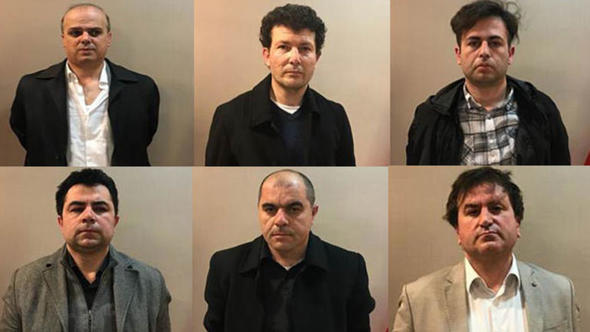Nordic Monitor
Critics of Turkish President Recep Tayyip Erdoğan who were kidnapped by Turkey’s National Intelligence Organization (MİT) in Kosovo had been included in a terrorism probe on fabricated charges by a Turkish prosecutor, judicial documents obtained by Nordic Monitor have revealed.
According to the decision by prosecutor Adem Akıncı, the Ankara Chief Public Prosecutor’s Office launched an investigation into nine educators in Kosovo who were listed in espionage files dispatched by Turkish diplomats in Pristina without any concrete evidence of wrongdoing.
The investigation also included Turkish nationals Kahraman Demirez, Mustafa Erdem and Yusuf Karabina, who were abducted by MİT in March 2018. Moreover, Akıncı indicted Hasan Hüseyin Demir, instead of whom Hasan Hüseyin Günakan was wrongly kidnapped by Turkish intelligence.
General Director of the Gülistan Education Institution Erdem; Assistant Director Karabina; the principal of a school in Gjakova, Demirez; two Gjakova teachers, Cihan Özkan and Günakan; and cardiology professor Osman Karakaya, who moved to the country to escape the persecution of the Erdoğan regime in Turkey, were detained by Kosovo police and taken to Turkey by private jet in a MİT operation on March 29, 2018. It was alleged that MİT was instructed to kidnap five Turks but that Özkan was added to the list in Pristina by then-Turkish Ambassador Kıvılcım Kılıç.
According to local sources in Kosovo, Turkey’s Pristina embassy was key to the logistics and planning of the abduction and served as a detention center for the abduction operation in Kosovo. The Turkish nationals were kept for a time at the embassy chancery or at the residence of Ambassador Kılıç. The Cumhuriyet daily reported that pictures were taken on the Turkish Embassy premises in Pristina by the state-run Anadolu news agency after their arrest.

New documents dated December 21, 2018 confirmed once more that intelligence reports created by Turkish diplomatic missions as part of a large-scale spying campaign have targeted critics and opponents of the Turkish government living outside Turkey and have been used in criminal cases in the country. Other Turkish nationals who were indicted by Turkish prosecutor in line with the spying lists are also in danger of being kidnapped.
According to official reports Turkey has sent 570 extradition requests to 94 countries in the last three-and-a-half years. Over 100 alleged members of the Hizmet/Gülen movement, a group critical of the Turkish government that appears to be the latest victim of the government of President Erdoğan, have been abducted abroad by Turkish intelligence and brought back to Turkey as part of the Turkish government’s global manhunt, according to a statement made by Turkish Foreign Minister Mevlüt Çavuşoğlu. They were reportedly subjected to torture and ill-treatment and were denied the right to a fair trial.

UN rapporteurs Luciano Hazan, chair-rapporteur of the Working Group on Enforced or Involuntary Disappearances; Felipe González Morales, special rapporteur on the Human Rights of Migrants; Fionnuala Ní Aoláin, special rapporteur on the Promotion and Protection of Human Rights and Fundamental Freedoms While Countering Terrorism; and Nils Melzer, special rapporteur on Torture and Other Cruel, Inhuman or Degrading Treatment or Punishment sent a joint letter to the Turkish government to express their concern about the “systematic practice of state-sponsored extraterritorial abductions and forcible return of Turkish nationals from multiple States to Turkey.”
According to the UN document, “[S]tate-sponsored extraterritorial abductions and forcible return of Turkish nationals from third countries may result in serious violations of the individuals’ rights to liberty, personal security, integrity and fair trial in contravention of the Universal Declaration of Human Rights (Articles 3, 5, 9 and 14), the International Covenant on Civil and Political Rights (ICCPR, Articles 7, 9, 13, 14, 18, 19 and 22) and the Convention against torture and other cruel, inhuman or degrading treatment or punishment (CAT, in particular Article 3), as well as the Declaration on the Protection of All Persons against Enforced Disappearance (Articles 2, 3, 6, 7, 13, 14 and 20).”
The UN rapporteurs also referred to “Article 7 of the Declaration [on enforced disappearance] stipulating that no circumstances whatsoever, whether a threat of war, a state of war, internal political instability or any other public emergency, may be invoked to justify enforced disappearances.”
In their letter the UN rapporteurs underlined that the Turkish government allegedly signed bilateral security cooperation agreements with multiple states for the expulsion or abduction of Turkish nationals and asked Turkey how those agreements are compatible with the country’s international human rights obligations.
The rapporteurs also requested information on the role of MIT and other institutions in those kidnapping operations. “The Government of Turkey, in coordination with other States, is reported to have forcibly transferred over 100 Turkish nationals to Turkey, of which 40 individuals have been subjected to enforced disappearance, mostly abducted off the streets or from their homes all over the world, and in multiple instances along with their children,” the letter said.
The UN rapporteurs asked the Turkish government to provide further information about its operations in coordination with authorities in Afghanistan, Albania, Azerbaijan, Afghanistan, Cambodia, Gabon, Kosovo, Kazakhstan, Lebanon and Pakistan for the abduction, arbitrary arrest, detention, enforced disappearance or torture of at least 100 individuals suspected of involvement with the Hizmet/Gulen movement. In addition, they accused the Turkish government of curtailing independent and effective investigations into these abuses.
The decision by prosecutor Adem Akıncı:












